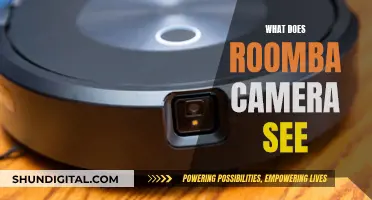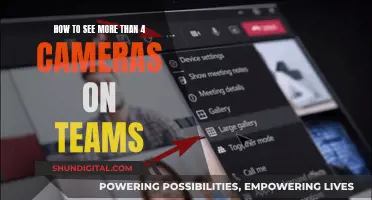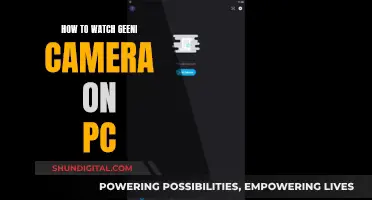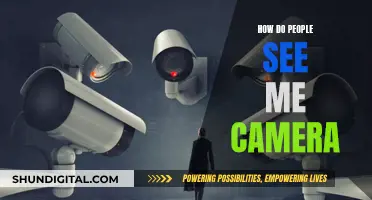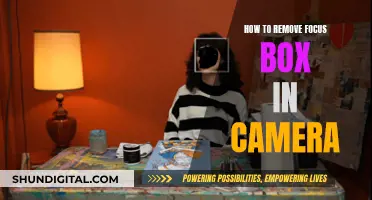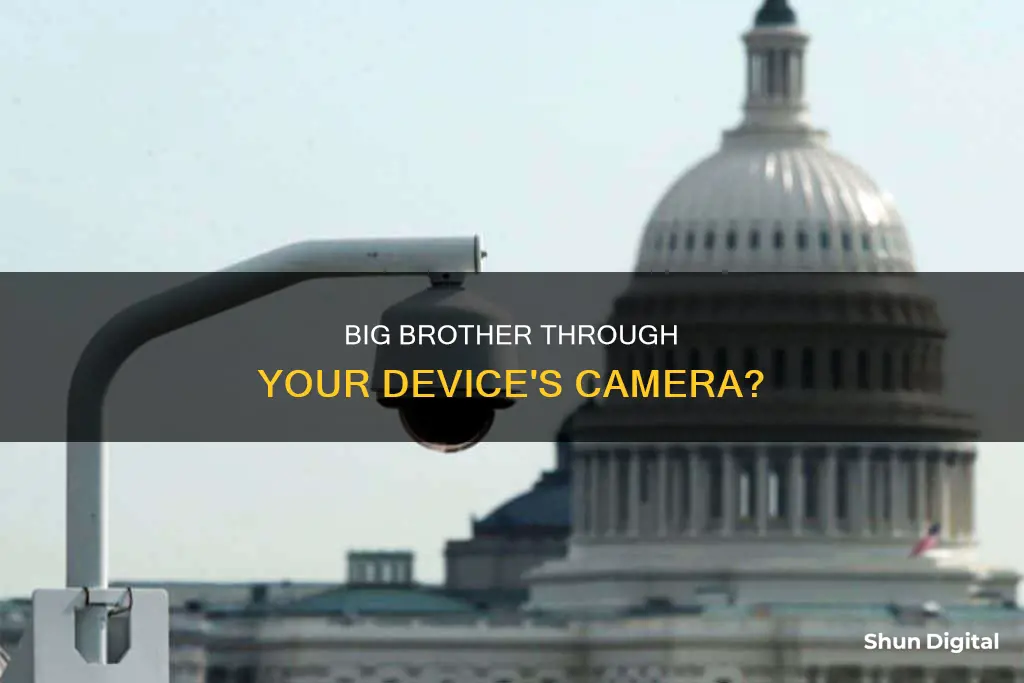
The idea that the government is watching us through our device cameras is a common fear, but is it a reality? In short, yes, it is possible. In 2013, Edward Snowden revealed that the NSA had a program called Optic Nerve, which captured webcam images from Yahoo users' video chats every five minutes. This, along with other revelations, showed that governments have the technology and legal authority to monitor their citizens. While it is unlikely that individuals are being watched unless they are a perceived threat, mass surveillance is a possibility, and it is clear that governments are collecting large amounts of metadata for this purpose.
| Characteristics | Values |
|---|---|
| Can the government watch you through your device's camera? | Yes, the government can spy on you through your device's camera. |
| How does the government do it? | By exploiting security vulnerabilities in your device's software or operating system, or by remotely accessing and activating cameras. |
| Do they need your permission? | No, it is done without your knowledge or consent. |
| Is it legal? | In the USA, controversial laws like FISA and the USA PATRIOT ACT allow for the collection of computer data, but these laws require the government to meet certain criteria beforehand. |
| What can the government do with the data? | The government can use the data for mass societal surveillance, to monitor and target individuals, and for law enforcement and border protection. |
| How can you protect yourself? | Use anti-spy software, cover your camera lens, use a VPN, avoid suspicious links and apps, and be cautious about what you post on social media. |
What You'll Learn

The government can access your device's camera without your consent
It is a common belief that governments can and do access private citizens' device cameras without their consent. This belief is not unfounded, as there have been several instances of government agencies accessing devices without authorisation.
In 2013, Edward Snowden leaked documents detailing the mass surveillance programs conducted by intelligence agencies, including the National Security Agency (NSA), Central Intelligence Agency (CIA), and the Federal Bureau of Investigation (FBI). Snowden's leak revealed that the NSA had a program called Optic Nerve, which captured webcam images from Yahoo users' video chats every five minutes and stored them for future use. It was estimated that between 3% and 11% of the images captured contained "undesirable nudity". Snowden's leak brought to light the potential for governments to remotely activate cameras and microphones without users' knowledge or consent.
Additionally, the CIA has been known to monitor individuals on their watch lists, and mobile phone users are particularly at risk of being watched by government agencies. The CIA can track an individual's every move, even via their smartphone. They use Stingrays, or "cell site simulators", to monitor the whereabouts of civilians and record their phone calls, texts, and other communications.
While it is important to recognise that governments have the technology and, in some cases, the legal authority to conduct surveillance, it is also essential to consider the ethical implications of such actions. Spying, even when carried out by the government, is generally considered unethical. However, some argue that it is necessary to help government agencies monitor criminals and maintain national security.
To protect your privacy, there are several measures you can take. One simple way is to use anti-spy software, such as Clario AntiSpy, which can help protect your data and personal information. Additionally, you can cover your device's camera lens with tape or a sticker, ensuring that anyone attempting to spy on you cannot record your private moments. Using a virtual private network (VPN) can also help mask your online activity and make it more difficult for government agencies to track your location.
DPS and Privacy: Cameras Watching Your Every Move?
You may want to see also

They can take pictures and record videos of you
It is a common belief that the government can spy on its citizens through their device cameras. In 2013, Edward Snowden leaked files that revealed the National Security Agency (NSA) carried out mass surveillance against Americans and citizens of other countries through a program called Optic Nerves. The program involved capturing webcam images every five minutes from Yahoo users' video chats and storing them for future use.
The government can access your device's camera to take pictures and record videos of you without your knowledge or consent. This can be done using spyware, which allows access to your camera and microphone. Once spyware is installed on your device, it can take control of your camera and microphone, recording you at any time, even when the app is not in the foreground. It can also run real-time face recognition software to detect your facial features and expressions.
The implications of this type of surveillance are far-reaching. For example, a documentary maker installed a "Find my Phone" application on a phone and let it get stolen. The documentary then tracked every move of the thief, from brushing their teeth to intimate moments with a loved one. This example highlights the potential for abuse of power and the invasion of privacy that government surveillance through device cameras can entail.
While the government may argue that spying is necessary to monitor criminals and protect national security, it is essential to consider the ethical implications and the potential for abuse. The right to privacy is included in the Universal Declaration of Human Rights, and individuals should be cautious and proactive in protecting their personal information and privacy.
To protect yourself from government surveillance through your device's camera, you can take several steps. Firstly, always cover your webcam with tape or use a camera cover. This simple step can give you peace of mind and prevent unwanted recording. Additionally, be cautious when granting app permissions. Before downloading an app, check what permissions it is requesting and whether they are truly necessary. For example, does a social media app really need access to your camera and microphone? Regularly reviewing and revoking unnecessary app permissions can help improve your privacy and security.
Do Principles Spy on Teachers via Cameras?
You may want to see also

Spyware can be installed on your device without your knowledge
Spyware can be installed on your device in several ways, and often without your knowledge. It can be installed by someone else deliberately, or it can come packaged with a program or app that you install yourself. Spyware often disguises itself as a useful program, such as download managers or video games. It can also be propagated through phishing emails or spoofed websites.
One of the most common ways for spyware to be installed is through unsecured Wi-Fi networks. When you connect to a public Wi-Fi network, you are essentially giving any potential hacker on that network access to your device. They can then install spyware or other malicious software without your knowledge.
Another way spyware can be installed is through a process called "jailbreaking" on iPhones or "rooting" on Android phones. This process allows users to gain root access to the operating system, giving them full control over the device. While this can be useful for some advanced users, it also opens up your device to potential security threats. If you don't properly secure your device after jailbreaking or rooting, it can be relatively easy for a hacker to gain access and install spyware.
In some cases, spyware can even be installed by government agencies. According to German magazine Der Spiegel, government agencies can insert spyware through iTunes. The installed software, such as FinFisher, can allow them to access your emails, social media accounts, and even your Skype calls.
It's important to be vigilant and take steps to protect your device from spyware. Here are some ways to reduce the likelihood of spyware being installed:
- Keep your operating system and software updated with the latest security patches.
- Use strong passwords and enable two-factor authentication.
- Be cautious when clicking links in emails or downloading files from unknown sources.
- Avoid using unsecured Wi-Fi networks, or use a Virtual Private Network (VPN) for added security.
- Be wary of granting permissions to apps, especially if they request access to your microphone, camera, or personal data.
- Regularly scan your device with antivirus and anti-malware software.
Target's Camera Surveillance: Who's Watching?
You may want to see also

The government can use your device's camera for mass surveillance
Government security agencies like the NSA have the capability to remotely access and activate device cameras without users' knowledge or consent. They can exploit security vulnerabilities in software or operating systems to gain access. This means that your device's camera can be used to spy on you, even when you are not actively using it. Additionally, apps that you grant camera access to can also access both the front and back camera, record you at any time, and take and upload pictures and videos without your knowledge.
While the government's use of mass surveillance through device cameras is a concern, it is important to note that cybercriminals and hackers also pose a significant threat. They can gain access to your device through various methods, such as malicious links, remote access tools, and even unsecured apps. To protect your privacy, it is recommended to use anti-spy software, cover your device's camera, and be cautious when granting apps access to your camera.
The government's ability to use device cameras for mass surveillance has raised ethical concerns. While some argue that it is necessary for monitoring criminals and national security, it also infringes on individuals' right to privacy. As technology advances, it is crucial for individuals to take precautionary measures to protect their personal information and privacy from potential government surveillance and cybercriminal activities.
Hotel Cameras: Privacy or Security?
You may want to see also

Covering your camera can help prevent unauthorised access
In the digital age, it is not uncommon to feel like you are being watched. With the rise of digital gadgets and social media platforms, our personal data is widely dispersed, and it can feel like our every move is being tracked. While it may seem paranoid to believe that the government is watching you through your device's camera, it is not an unfounded fear.
In 2013, Edward Snowden leaked the NSA files, revealing that the National Security Agency (NSA) carried out mass surveillance against Americans and citizens of other countries through a program called Optic Nerves. This program captured webcam images from Yahoo users' video chats every five minutes, and it is estimated that between 3% and 11% of the images captured contained "undesirable nudity". Additionally, security researcher Jacob Appelbaum revealed that the NSA uses spyware known as DROPOUTJEEP to access iPhones through backdoors.
Government security agencies like the NSA can gain access to your devices through in-built backdoors, allowing them to tune in to your phone calls, read your messages, capture pictures and videos, and even stream footage from your camera, all without your knowledge or consent. While some argue that this type of surveillance is necessary to monitor criminals and protect national security, it is an invasion of privacy.
So, what can you do to prevent unauthorised access to your device's camera? One simple yet effective solution is to cover your camera lens. By placing a piece of tape or a sticker over your camera, you can physically block any potential intruders from recording you. This method is endorsed by none other than former FBI director James Comey, who, when asked if he covered his laptop's webcam with tape, responded, "Heck yeah". Mark Zuckerberg has also been spotted with tape over his laptop camera, taking extra precautions to protect his privacy. While it may seem like a drastic measure, covering your camera can give you peace of mind and prevent unwanted exposure.
In addition to covering your camera, there are other precautions you can take to protect your privacy. This includes using a virtual private network (VPN), which masks your real IP address and makes it appear as though you are accessing the internet from another location. Enabling two-factor authentication, setting strong passwords, and being cautious when clicking links or downloading files can also help fortify your digital security.
While it is challenging to guarantee that the government will never spy on you, taking these proactive measures can significantly reduce the likelihood of unauthorised access to your device's camera.
Are School Cameras Watched?
You may want to see also
Frequently asked questions
Yes, the government can technically spy on you through your device's camera. This can be done using spyware, which allows access to your camera, enabling them to take pictures and record videos without your knowledge or consent.
There are several signs that may indicate the government is watching you through your device's camera:
- Strange camera activity, such as the camera turning on by itself.
- Camera light or flash being activated.
- High battery depletion rate, device overheating, and high data usage.
- Unfamiliar files, apps, text messages, or emails on your device.
Here are some measures you can take to protect your privacy:
- Use anti-spy software or a virtual private network (VPN) to mask your online activity.
- Cover your device's camera lens with tape or a sticker when not in use.
- Be cautious when granting app permissions and avoid downloading apps from untrusted sources.
- Keep your device's software and operating system up to date to patch security vulnerabilities.
In some countries, controversial laws allow the government to collect data from computers and devices. However, they usually need to meet certain criteria and obtain legal warrants beforehand. The legality of government surveillance varies depending on the country and its laws.


